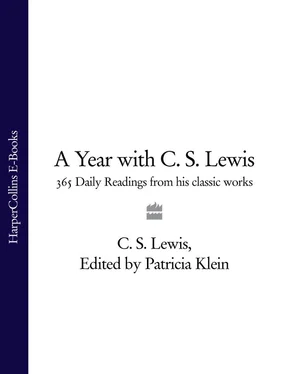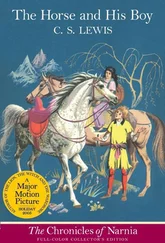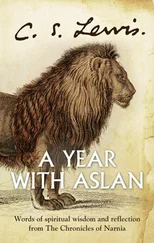6 A Pleasant Theology 6 A Pleasant Theology One reason why many people find Creative Evolution so attractive is that it gives one much of the emotional comfort of believing in God and none of the less pleasant consequences. When you are feeling fit and the sun is shining and you do not want to believe that the whole universe is a mere mechanical dance of atoms, it is nice to be able to think of this great mysterious Force rolling on through the centuries and carrying you on its crest. If, on the other hand, you want to do something rather shabby, the Life-Force, being only a blind force, with no morals and no mind, will never interfere with you like that troublesome God we learned about when we were children. The Life-Force is a sort of tame God. You can switch it on when you want, but it will not bother you. All the thrills of religion and none of the cost. Is the Life-Force the greatest achievement of wishful thinking the world has yet seen? —from Mere Christianity 1943 The Abolition of Man is published by Oxford University Press.
7 Damned Nonsense 7 Damned Nonsense If you do not take the distinction between good and bad very seriously, then it is easy to say that anything you find in this world is a part of God. But, of course, if you think some things really bad, and God really good, then you cannot talk like that. You must believe that God is separate from the world and that some of the things we see in it are contrary to His will. Confronted with a cancer or a slum the Pantheist can say, ‘If you could only see it from the divine point of view, you would realise that this also is God.’ The Christian replies, ‘Don’t talk damned nonsense.’ For Christianity is a fighting religion. It thinks God made the world—that space and time, heat and cold, and all the colours and tastes, and all the animals and vegetables, are things that God ‘made up out of His head’ as a man makes up a story. But it also thinks that a great many things have gone wrong with the world that God made and that God insists, and insists very loudly, on our putting them right again. —from Mere Christianity 1955 Lewis takes up residence in Magdalene College, Cambridge.
8 Something Beyond 8 Something Beyond I think all Christians would agree with me if I said that though Christianity seems at the first to be all about morality, all about duties and rules and guilt and virtue, yet it leads you on, out of all that, into something beyond. One has a glimpse of a country where they do not talk of those things, except perhaps as a joke. Every one there is filled full with what we should call goodness as a mirror is filled with light. But they do not call it goodness. They do not call it anything. They are not thinking of it. They are too busy looking at the source from which it comes. But this is near the stage where the road passes over the rim of our world. No one’s eyes can see very far beyond that: lots of people’s eyes can see further than mine. —from Mere Christianity
9 Somebody Who? 9 Somebody Who? We have two bits of evidence about the Somebody [behind the Moral Law]. One is the universe He has made. If we used that as our only clue, then I think we should have to conclude that He was a great artist (for the universe is a very beautiful place), but also that He is quite merciless and no friend to man (for the universe is a very dangerous and terrifying place). The other bit of evidence is that Moral Law which He has put into our minds. And this is a better bit of evidence than the other, because it is inside information. You find out more about God from the Moral Law than from the universe in general just as you find out more about a man by listening to his conversation than by looking at a house he has built. —from Mere Christianity
10 A Good Time Was Had by All 10 A Good Time Was Had by All By the goodness of God we mean nowadays almost exclusively His lovingness; and in this we may be right. And by Love, in this context, most of us mean kindness—the desire to see others than the self happy; not happy in this way or in that, but just happy. What would really satisfy us would be a God who said of anything we happened to like doing, ‘What does it matter so long as they are contented?’ We want, in fact, not so much a Father in Heaven as a grandfather in heaven—a senile benevolence who, as they say, ‘liked to see young people enjoying themselves’, and whose plan for the universe was simply that it might be truly said at the end of each day, ‘a good time was had by all’. Not many people, I admit, would formulate a theology in precisely those terms: but a conception not very different lurks at the back of many minds. I do not claim to be an exception: I should very much like to live in a universe which was governed on such lines. But since it is abundantly clear that I don’t, and since I have reason to believe, nevertheless, that God is Love, I conclude that my conception of love needs correction. —from The Problem of Pain 1950 Lewis receives his first letter from American fan Joy Davidman Gresham.
11 More Than Mere Kindness 11 More Than Mere Kindness There is kindness in Love: but Love and kindness are not coterminous, and when kindness (in the sense given above) is separated from the other elements of Love, it involves a certain fundamental indifference to its object, and even something like contempt of it. Kindness consents very readily to the removal of its object—we have all met people whose kindness to animals is constantly leading them to kill animals lest they should suffer. Kindness, merely as such, cares not whether its object becomes good or bad, provided only that it escapes suffering. As Scripture points out, it is bastards who are spoiled: the legitimate sons, who are to carry on the family tradition, are punished [Hebrews 12:8]. It is for people whom we care nothing about that we demand happiness on any terms: with our friends, our lovers, our children, we are exacting and would rather see them suffer much than be happy in contemptible and estranging modes. If God is Love, He is, by definition, something more than mere kindness. And it appears, from all the records, that though He has often rebuked us and condemned us, He has never regarded us with contempt. He has paid us the intolerable compliment of loving us, in the deepest, most tragic, most inexorable sense. —from The Problem of Pain 1942 Lewis begins his second series of BBC talks entitled “What Christians Believe.” These talks were later published in Broadcast Talks (or, in the U.S., The Case for Christianity ) and comprise Book 2 in Mere Christianity .
12 Amazing Love, How Can It Be? 12 Amazing Love, How Can It Be? When Christianity says that God loves man, it means that God loves man: not that He has some ‘disinterested’, because really indifferent, concern for our welfare, but that, in awful and surprising truth, we are the objects of His love. You asked for a loving God: you have one. The great spirit you so lightly invoked, the ‘lord of terrible aspect’, is present: not a senile benevolence that drowsily wishes you to be happy in your own way, not the cold philanthropy of a conscientious magistrate, nor the care of a host who feels responsible for the comfort of his guests, but the consuming fire Himself, the Love that made the worlds, persistent as the artist’s love for his work and despotic as a man’s love for a dog, provident and venerable as a father’s love for a child, jealous, inexorable, exacting as love between the sexes. How this should be, I do not know: it passes reason to explain why any creatures, not to say creatures such as we, should have a value so prodigious in their Creator’s eyes. It is certainly a burden of glory not only beyond our deserts but also, except in rare moments of grace, beyond our desiring; we are inclined, like the maidens in the old play, to deprecate the love of Zeus. But the fact seems unquestionable. —from The Problem of Pain 1951 Janie King Moore (Mrs. Moore) dies at the age of seventy-eight in Oxford and is buried at Holy Trinity Church in Headington Quarry, Oxford. Mrs. Moore (the mother of Lewis’s army buddy Paddy Moore) and her daughter Maureen come under Lewis’s care after Paddy’s death in World War I.
Читать дальше












